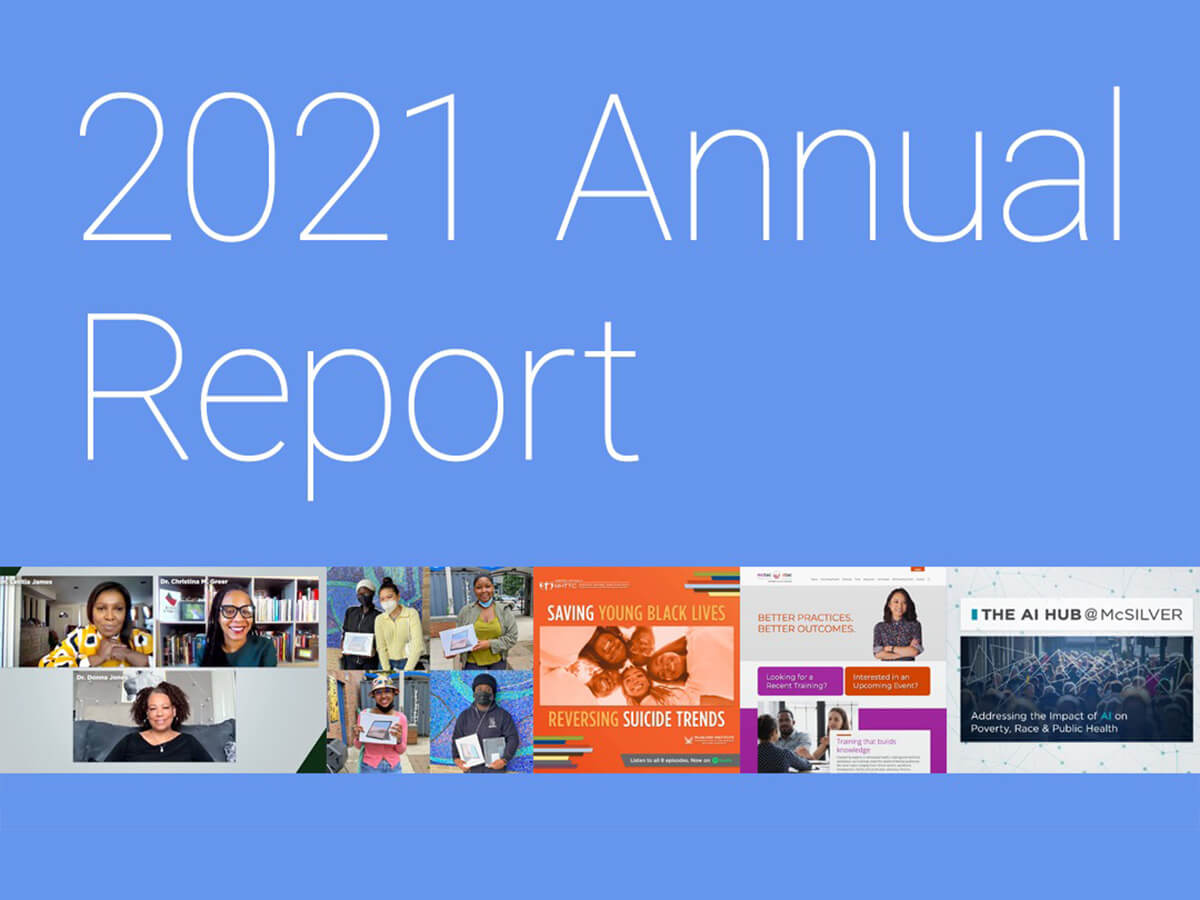Highlights include a new AI Hub and legislative progress, as we continued our commitment to disrupting poverty and inequity.
NEW YORK, February 9, 2022 — Emerging technologies helped to propel the NYU McSilver Institute for Poverty Policy and Research toward a new horizon in 2021, as we continued our mission to disrupt poverty and inequity.
That mission has taken on greater-than-ever urgency during the COVID-19 pandemic, and the way that we work has evolved to meet the demands of a rapidly-changing landscape for youth-centered services, behavioral health research and social justice policy.
Our 2021 Annual Report describes how we met the moment, driven by the knowledge that the need for policies and interventions that disrupt poverty and inequity is as urgent as ever.
Highlights include:
- The AI Hub at McSilver was established in June, marking the most significant expansion of our work since our founding. Our founder Dr. Constance McCatherin Silver continued her singular vision for McSilver through the $5 million gift she and her husband Martin Silver made to fund the Hub. The Hub will enable us to investigate how artificial intelligence-driven (AI) systems can be used to equitably address poverty and challenges relating to race and public health, and to provide thought leadership on the implications.
- Our policy advocacy in this space reached an important milestone in May when the House of Representatives passed H.R. 1475, the Pursuing Equity in Mental Health Act on a bipartisan basis. The legislation was co-sponsored by U.S. Representatives Bonnie Watson Coleman (NJ–12) and John Katko (NY–24), following months of work by the Congressional Black Caucus Emergency Taskforce on Black Youth Suicide and Mental Health, including a report developed by a working group of experts led by NYU McSilver. The bill authorizes $805 million in grants and other funding.
- In May we received federal funding to study a novel child maltreatment intervention named Safe Mothers Safe Children (SMSC) in a randomized controlled clinical trial. The study will receive funding of $3.5 million over 5 years from the Eunice Kennedy Shriver National Institute of Child Health and Human Development, one of the National Institutes of Health.
- Our Community Technical Assistance Center of New York (CTAC) contract was awarded a multi-year addition for the Youth ACT Technical Assistance Center (YTAC), to provide training and technical assistance to 14 New York State providers who will be the first to implement an Assertive Community Treatment (ACT) program for children.
- New methodologies came to New York City municipal elections in 2021, with voters casting ballots under a new ranked-choice voting system, and McSilver responded with a voter education outreach campaign of webinars, media interviews and op-eds, in partnership with the Committee for Ranked Choice Voting NYC.
- We also hosted community engagement forums with elected officials such as New York Attorney General Letitia James, U.S. Representative Gregory Meeks and New York State Senator Gregory Meeks; and were involved in the moderation of a mayoral candidates forum. Community organizations such as the Greater New York Chapter of The Links Inc., Boys and Girls Club of Harlem and The Haitian Roundtable partnered with us in these forums.
Our annual report contains details about these developments and many more. As always, we thank our McSilver staff, funders, NYU colleagues, many community partners and you, for your continuing support of our work.
About the NYU McSilver Institute
The NYU McSilver Institute for Poverty Policy and Research is committed to creating new knowledge about the root causes of poverty, developing evidence-based interventions to address its consequences, and rapidly translating research findings into action through policy and best practices. Learn more at mcsilver.nyu.edu and sign up for updates.
